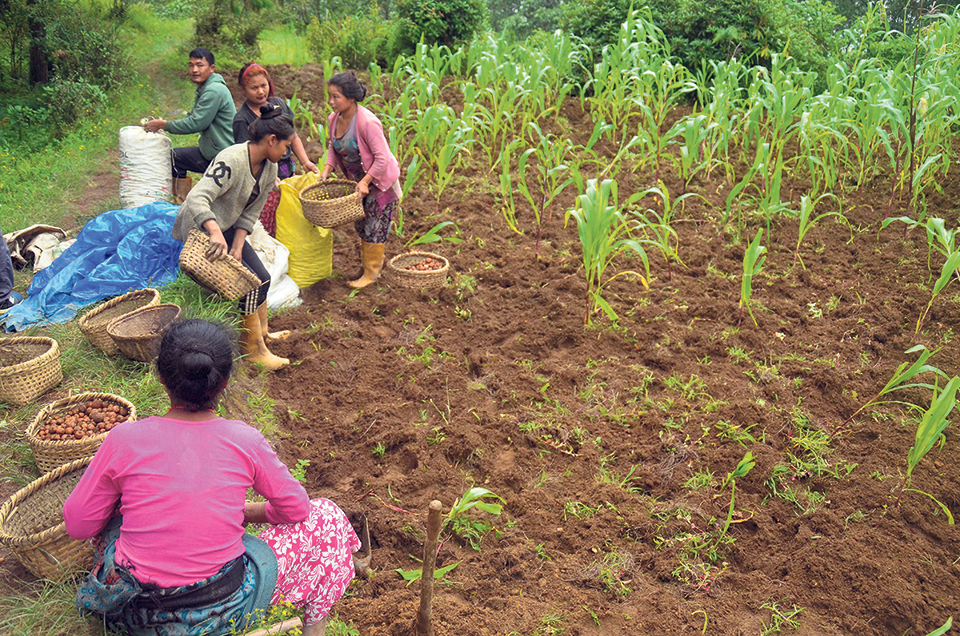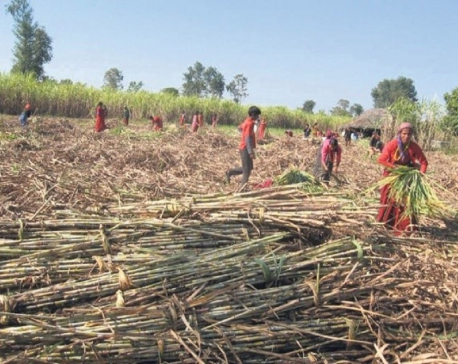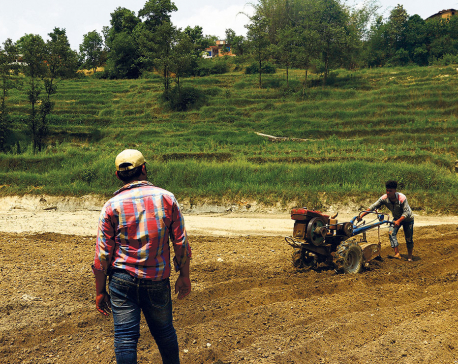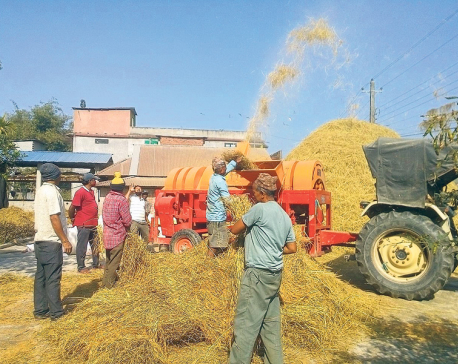
OR

Farmers cannot and should not stay at home during the lockdown. But it is necessary to create a working environment for them by providing them personal protective equipment (PPE) in subsidized rates.
Although the COVID-2019 epidemic is primarily a public health crisis, its impact on other sectors including the agriculture supply chain has started to be visible. The outbreak has already caused significant economic disruption around the world and is likely to continue to do so for some length of time. Regarding agriculture, it has an effect on both the supply-side and the demand side. Restrictions on the movement of goods and people have significant socio-economic repercussions on people's livelihoods. They often lead to disruption of market chains and trade of agricultural products, with significant potential impacts on the populations that depend on them for their livelihoods and their food and nutrition security. Supply chain management (SCM) in agriculture implies managing the relationships between the businesses responsible for the efficient production and supply of products from the farm level to the consumers.
Social distancing, reduced social and religious functions, minimizing travel, avoiding crowds, closures, and other protective practices to slow the spread of COVID-19 have an impact on markets and prices of food items, dairy products, meat, flowers, and ornamental plants. There is a supply chain slowdown affecting the transportation of fertilizer, fuel, and other production inputs. The risk of contracting novel coronavirus has kept farmers indoors and away from their fields, and the lockdown has created a shortage of hired workers to work in the fields. In fact, farm labor availability has been an issue in all parts of the country.
The enforcement of lockdown has created a problem for the farmers to harvest seasonal vegetables. This has resulted in a shortage of vegetables in the markets. This is also the season for tea plucking but it has been stopped due to labor shortage. Field preparation and sowing of the seed of other crops have also been affected due to the lockdown. This is the right time to plant maize and spring paddy. Poultry birds are killed due to the lack of feed supply.
Poultry entrepreneurs are facing a loss of nearly Rs 220 million per day due to the nationwide lockdown. There is a shortage of required raw materials to run the poultry industry. Many employees have also returned to their villages and there is a shortage of grains for the chickens. Similarly, the farmers are unable to sell the milk due to the unavailability of transport means and are throwing away liters of milk in ponds, drain, and roads in the wake of the lockdown imposed in the country to curb the spread of the novel coronavirus.
In fact, farmers have started destroying their agricultural products as they have not been getting a market due to the restriction of movement. Seasonal vegetables are most affected as most of them are perishable items and there are no cold stores in the production areas. Vegetables like tomato, cauliflower, and cabbage are rotting in the fields.
Farmers cannot and should not stay at home during the lockdown period. They have to work in the field. If they stay at home at this time, there will be nothing to eat in the next season. So it is very necessary to create a working environment for the farmers and it can be done by providing them personal protective equipment (PPE) in subsidized rates. The use of PPE to minimize pesticide exposure on farmers' bodies is a common practice. But will the PPE use for this purpose work for coronavirus protection or is there a need to design the special one for this purpose?
As the responsible agency for research, Nepal Agriculture Research Council (NARC) should start work to design it if needed. The Agriculture Knowledge Centers (AKCs) should develop guidelines on how to work safely in the field under such a situation. The National Commodity/Discipline Centers under the Department of Agriculture should support AKCs to develop such guidelines. Farmers should be well aware of the need for wearing PPE and maintaining social distance while working in the field.
During the lockdown period, the movement of public transport has been restricted while food markets and groceries have been partially open. But there is no standard operating procedure (SOPs) to operate them safely. The Ministry of Supply should come up with standard operating procedures for the delivery of essential services through wholesale markets and retail shops. E-Commerce companies should also follow such operating guidelines for home delivery. The government should have a buffer of food items to help the most vulnerable people comply with stay-at-home regulations.
At the moment, fresh produces are accumulating at farms, resulting in food loss. Although the government has recently introduced a stimulus package, it lacks clear incentives for smallholder farmers. Farmers need safety net programs that can enhance their productivity. Banks should wave fees on farmers’ loans and extend payment deadlines. A capital injection in the agricultural sector can help small and medium agri-businesses to continue operations. Improving storage can help reduce post-harvest crop losses along the supply chain.
The food value chain can be broadly divided into two groups: the staple commodities (rice, wheat, maize, soybeans, and oilseeds) and the high-value commodities (fruits, vegetables, and fishery). The staple commodity production is capital intensive, and the labor shortage issue resulting from the coronavirus-related restrictions on movement has less impact on their production. However, the logistics to distribute the commodities is affected, as it hampers food transportation across cities, provinces, and countries. Logistical barriers that disrupt the food supply chains affect the high-value commodities even more because of their perishability. High-value commodities also require a large amount of labor to produce. So they are substantially affected when laborers are not able to travel due to lockdowns. The government should allow farmers to go out to the fields while maintaining a safe distance.
The Ministry of Agriculture and Livestock Development (MOALD) should carefully monitor the situation and then take necessary measures. Recognizing the importance of ensuring the supply of food in good quantity and quality during the epidemic period and beyond, the government should try to minimize logistics disruptions in the supply chains and bring special production programs with market guarantee of the produce. Major staple commodities should move across the country smoothly. Nepal needs international funding to support many smallholder farmers. There are funding mechanisms, such as the Global Agriculture and Food Security Program, which was created in the aftermath of the 2007-2008 food crisis for this purpose. The government should have transparent dialogues with the development partners on this issue.
You May Like This

Help the farmers or brace for massive protests
The coronavirus pandemic has exposed our vulnerabilities. During these difficult times, we have been threatened in many ways. One mighty... Read More...

Govt to finalize compensation to farmers at huge loss due to virus
KATHMANDU, April 8: The Ministry of Agriculture and Livestock Development has started work on a relief package for farmers suffering... Read More...

Farmers hit as authorities fail to fix prices for paddy
JHAPA, Dec 21: Food products prices in the market are ever increasing. Because of soaring prices of rice, pulse and vegetables,... Read More...




Just In
- CM Kandel requests Finance Minister Pun to put Karnali province in priority in upcoming budget
- Australia reduces TR visa age limit and duration as it implements stricter regulations for foreign students
- Govt aims to surpass Rs 10 trillion GDP mark in next five years
- Govt appoints 77 Liaison Officers for mountain climbing management for spring season
- EC decides to permit public vehicles to operate freely on day of by-election
- Fugitive arrested after 26 years
- Indian Potash Ltd secures contract to bring 30,000 tons of urea within 107 days
- CAN adds four players to squad for T20 series against West Indies 'A'















Leave A Comment